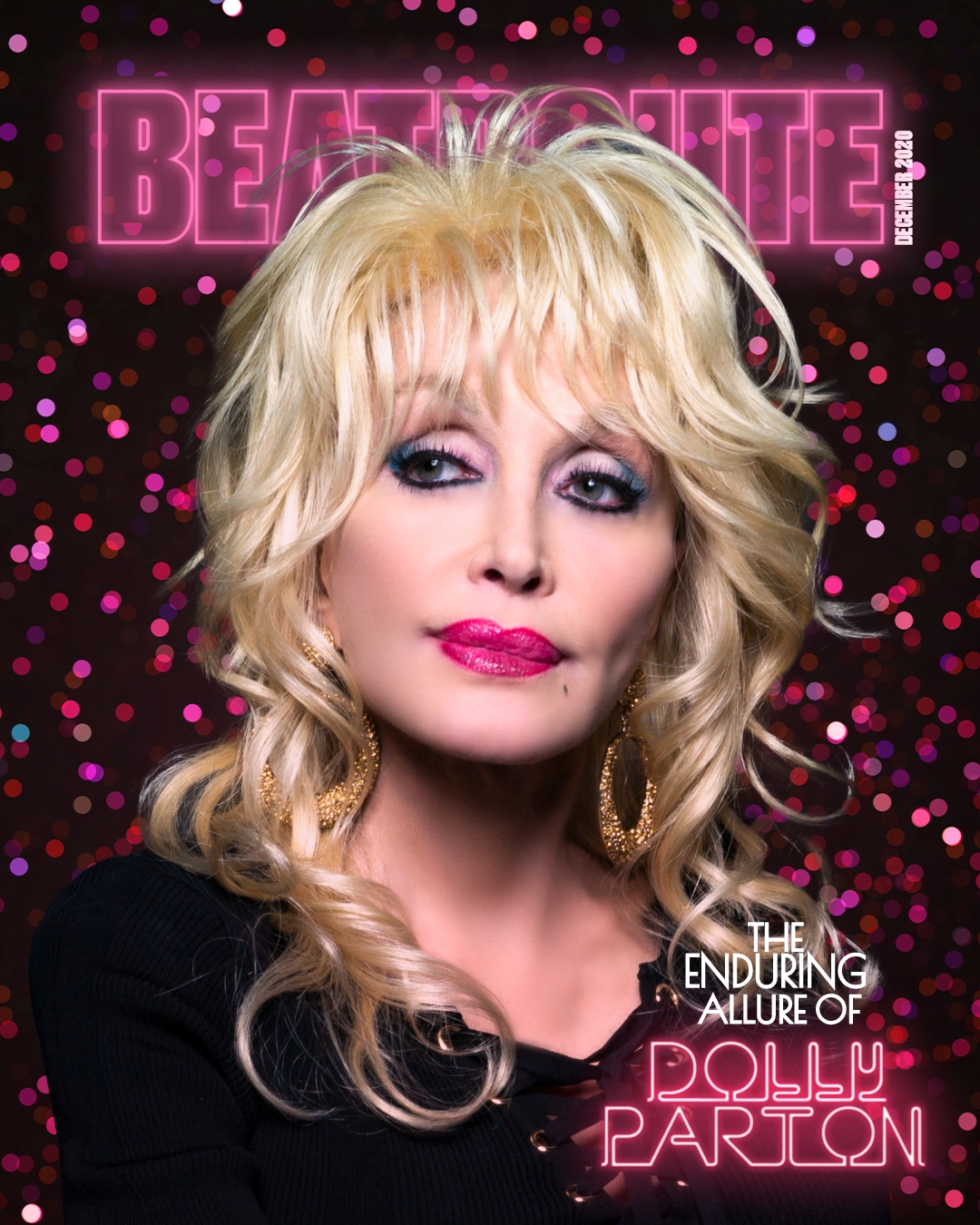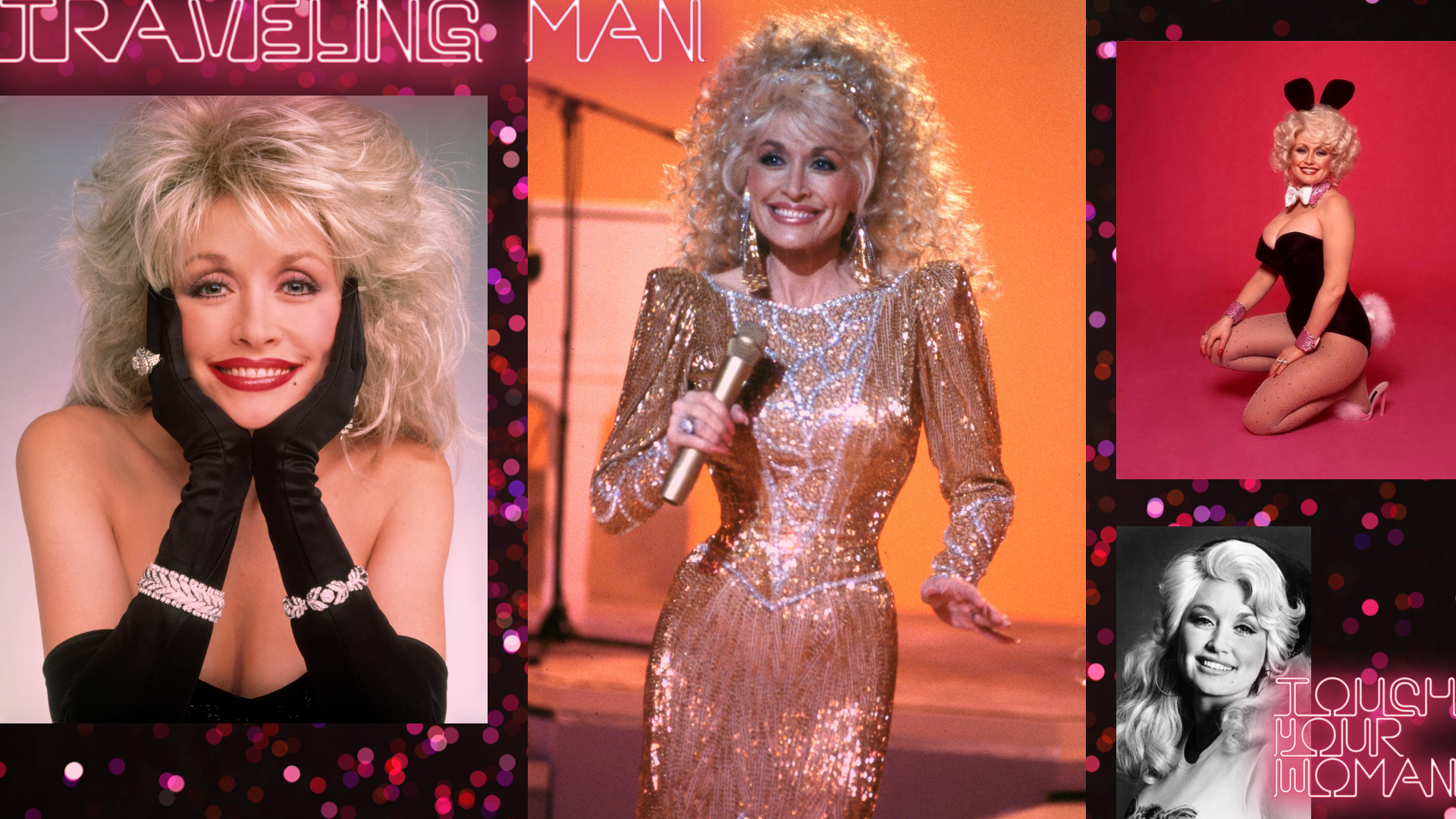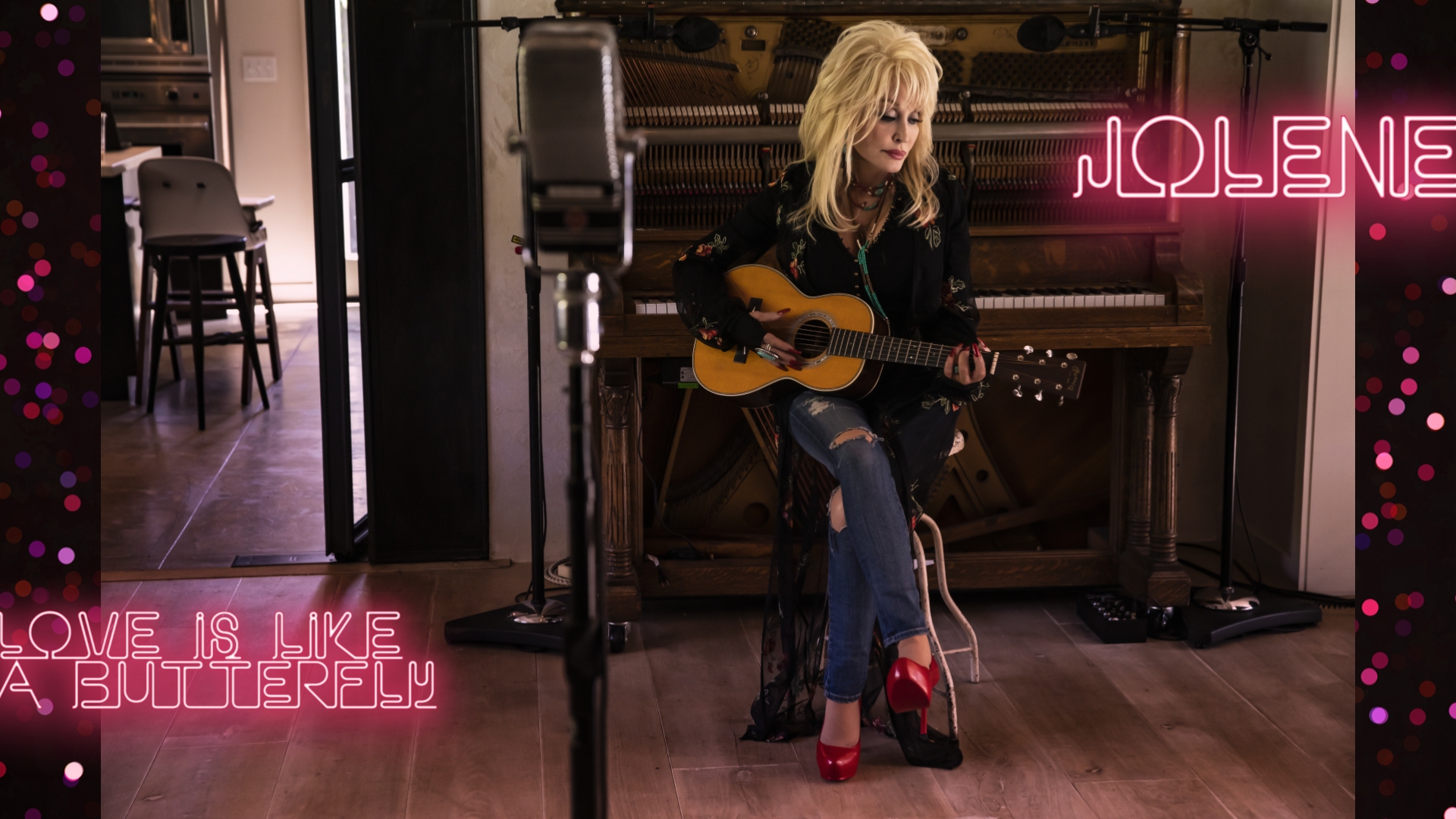COVER
Dolly Parton
The Enduring Allure of an Icon
By Leah Faye Cooper
Publishing date: Dec 01, 2020
D
During a year marked by the type of difficulty and surrealism you never actually think you’ll experience in real life, anything that makes you smile is worth committing to long-term memory. So, that day last spring, when I was on lockdown at my sister and brother-in-law’s house in Brooklyn, and caught a glimpse of my seven-year-old niece strumming the melody of “9 to 5” on her pink ukulele—opposite a MacBook screen on which her music teacher was leading a Zoom lesson on Dolly Parton to the second-grade class—is forever cemented in my mind.
Six months later I’m back at my apartment in downtown Manhattan, serendipitously on the phone with Parton discussing her slew of current projects and inimitable career. “I know it’s a lot of Dolly,” she says, “I’m about to puke myself. [laughs] But this has turned out to be a year that I could do a lot of things safely creatively, and I try to put stuff out when I can.”
Among that stuff is A Holly Dolly Christmas—Parton’s 47th solo studio album. (You read that number correctly.) The featured artists are a handful of close friends and family: Michael Bublé, Billy Ray Cyrus and Parton’s goddaughter, Miley Cyrus, Jimmy Fallon, Willie Nelson, and Parton’s younger brother, Randy.
During a year marked by the type of difficulty and surrealism you never actually think you’ll experience in real life, anything that makes you smile is worth committing to long-term memory. So, that day last spring, when I was on lockdown at my sister and brother-in-law’s house in Brooklyn, and caught a glimpse of my seven-year-old niece strumming the melody of “9 to 5” on her pink ukulele—opposite a MacBook screen on which her music teacher was leading a Zoom lesson on Dolly Parton to the second-grade class—is forever cemented in my mind.
Six months later I’m back at my apartment in downtown Manhattan, serendipitously on the phone with Parton discussing her slew of current projects and inimitable career. “I know it’s a lot of Dolly,” she says, “I’m about to puke myself. [laughs] But this has turned out to be a year that I could do a lot of things safely creatively, and I try to put stuff out when I can.”
Among that stuff is A Holly Dolly Christmas—Parton’s 47th solo studio album. (You read that number correctly.) The featured artists are a handful of close friends and family: Michael Bublé, Billy Ray Cyrus and Parton’s goddaughter, Miley Cyrus, Jimmy Fallon, Willie Nelson, and Parton’s younger brother, Randy.

I know it’s a lot of Dolly. I’m about to puke myself.
I know it’s a lot of Dolly. I’m about to puke myself.
“I’ve been wanting to do another solo Christmas album for a long time,” Parton says, her Tennessee twang remarkably distinct. “My album with Kenny Rogers was such a big success, but that was 30 years ago.” Her timing was perfect. Music is one of few universal reprieves, and as the world faces a global pandemic, fans have 12 new tracks to get lost in—from Parton’s playful take on Mariah Carey’s “All I Want for Christmas,” to the melodic “Circle of Love.”
Earlier this year, around the same time that Parton’s creative director Steve Summers teased the album’s release during an interview with Linda Perry, it was announced that the country music star made a $1 million donation towards COVID-19 research to the Vanderbilt University Medical Center. The gift was profoundly generous, but not at all surprising coming from Parton. Since 1995 she’s donated over 130 million books to children through her Imagination Library, and her decades-long philanthropy has supported everything from HIV/AIDS charities to wildfire relief. What was noteworthy, though, was that just days after our conversation it was announced that Parton’s donation to Vanderbilt helped fund Moderna’s promising COVID-19 vaccine. For a woman who grew up poor in rural Tennessee—one of twelve siblings raised in a cabin with no indoor plumbing and at times, no electricity—it’s a sterling deed.
“I was singing locally on radio and television before we even owned a television,” she says. “I wanted to sing at the Grand Ole Opry [and] I wanted to make money… but no one could have imagined all the wonderful things that have happened to me.”

I do love being busy.
Parton moved to Nashville in 1964 the day after her high school graduation, first gaining recognition as a songwriter. A permanent spot on country singer Porter Wagoner’s weekly syndicated television show followed, as did the release of Parton’s debut album Hello, I’m Dolly in 1967. The decades since have seen Parton’s star rise extraordinarily. There was the release of Jolene in 1974, which featured a now-legendary title track and “I Will Always Love You,” the latter famously re-recorded by Whitney Houston. In 1980 she agreed to star in 9 to 5 alongside Jane Fonda and Lily Tomlin under the condition that she could write and record the theme song. The role earned Parton a Golden Globe nomination; the song won her two of her nine Grammys. Parton’s duet “Islands in the Stream” with the late Kenny Rogers became an instant classic when released in 1983, and the same can be said for Steel Magnolias, the 1989 film that saw he star alongside Julia Roberts and Sally Field. Lest we forget that she’s owned and operated her Dollywood theme park for 34 years and nurtured a marriage to husband Carl Dean for 54. Did Parton dream of one day singing in front of thousands of fans? Absolutely. Did she think that in her seventies she’d ignite a viral social media challenge or see her face on an Alessandro Michele-designed Gucci jacket? Not so much.
This rare, intergenerational celebrity is attributed as much to her talent as it is her business savviness. While Parton has been reluctant to label herself a feminist in the past, she’s crashed many a glass ceiling both within and outside country music, and done so with an unapologetic embrace of an aesthetic she’s dubbed Backwoods Barbie. She famously once said, “I’ve done business with men who think I’m as silly as I look. By the time they realize I’m not, I’ve done got the money and gone.” Some of that money was earned through the production company Parton established with her late Uncle Bill Owens when she was just 20, ensuring that she’d maintain the copyright to her songs. The film and television production company she confounded years later produced the movie Father of the Bride and cult classic TV show Buffy the Vampire Slayer. Her favorite piece of business advice is simple. “That old saying, ‘to thine own self be true,’ there is so much in that statement,” she says. “You’ve got to stay true to who you are. You gotta know what your gifts are [and] what you’re willing to sacrifice for your dreams. You’re going to have to compromise some things, but you don’t ever need to compromise your principles, your values, or your soul.”
This encouragement of individuality has resonated with fans across race, religion, gender identity, political affiliation, sexual orientation… this list goes on and on. Parton’s famed self-deprecating humor adds another notch in her belt of appeals. “I’m a self-made woman and I have the doctor bills to prove it,” she recently quipped to her 3.7 million Instagram followers.

“I do love being busy,” Parton says rather nonchalantly when I bring up the scope and longevity of her career. “I love being creative and I love making things happen. When I do take off, I enjoy my private time at home, but I don’t like long vacations; I’m fine with a week.”
There’s certainly been no vacationing lately. When we spoke she was two days out from a livestream performance and Q&A with Amazon Music, and it had just been announced that she was teaming up with CBS for a forthcoming holiday special. In addition to promoting the new album, she’s also been on countless calls and Zooms to discuss her latest coffee table book, Dolly Parton Songteller: My Life in Lyrics, and her film Dolly Parton’s Christmas on the Square, now streaming on Netflix. While much of this work is being done from home, the stiletto and sequin enthusiast has yet to hang up her blonde wigs or shelf her red lipstick.
“I get up every day and I put on makeup and fix my hair,” she says. “I wear more comfortable clothes around the house, but I try to stay prettied up a little.” Today’s look? A leopard-print sweater, skinny black pants, and gold high heels, she tells me. When the conversation turns to fitness (I’m curious to know if she’s ever done her namesake Peloton ride) Parton is unabashed in her frankness: “I don’t do much working out. I’m mostly playing my music while everyone else is exercising.”
Acknowledging that 2020 has been a difficult year for many, Parton says that now more than ever, she’s leaning on her faith. “I always pray about everything, and in this day and time, I’ve been praying harder and harder. I’m just hoping that God is in this somehow and that maybe we’re going to get rebooted in the universe and things are going to get better… I sure hope so.”
Parton likens her life story to that of Cinderella’s, though her version of happily ever after involves more music, more entertaining, and more work that will be boundless in its reach—touching fans overseas and kids in Brooklyn alike. “To know that a little girl is singing something that I wrote, that truly warms my heart,” she says when I mention my niece. “To me, this is a way of life. It’s not really my job, it’s my joy.”
Photographer: Rob Hoffman
